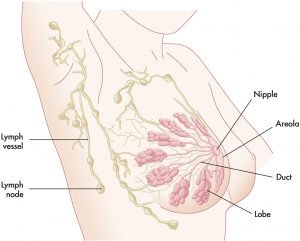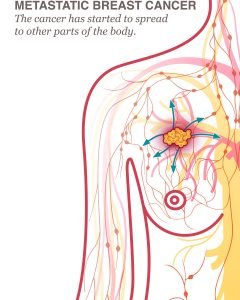Pakistan alone has the highest rate of Breast Cancer than any other Asian country as approximately 90000 new cases are diagnosed every year out of which 40000 die.
 Introduction to Breast Cancer:
Introduction to Breast Cancer:
Breast cancer is cancer that forms in the cells of the breasts. There are different kinds of breast cancer. The kind of breast cancer depends on which cells in the breast turn into cancer.
Most breast cancers begin in the ducts or lobules.
Mammary cancer can begin in different parts of the breast. A breast is made up of three main parts: lobules, ducts, and connective tissue. The lobules are the glands that produce milk. The ducts are tubes that carry milk to the nipple.
Mostly it begin in the ducts or lobules.
Mammary cancer can spread outside the breast through blood vessels and lymph vessels. When breast cancer spreads to other parts of the body, it is said to have metastasized.
Causes of Breast Cancer:
Some cells divide more rapidly than healthy cells do and continue to accumulate, forming a lump or mass. Cells may spread (metastasize) through your breast to your lymph nodes or to other parts of your body.
Researchers have outlined the following factors that may increase the risk of getting mammary cancer;
- Hormonal
- Lifestyle
- Environmental
It’s likely that breast cancer is caused by a complex interaction of one’s genetic makeup and environment.
Other causes/factors may include;
- Inherited genes that increase cancer risk
- Radiation exposure
- Obesity
- Increasing age
- Family history of this disease
- Estrogen exposure and breast-feeding
Classification of Tumor
Benign Tumor
When a tumor is diagnosed as benign, doctors will usually leave it alone rather than remove it. As it is non cancerous. But it may cause pain by pushing onto side organs in which case they are surgically removed.
Malignant Tumor
Malignant tumors are cancerous and aggressive because they invade and damage surrounding tissue. In case of suspicion, a biopsy is performed.
Metastatic Tumor
Metastatic cancer is when cancer cells of a malignant tumor spread to other parts of the body, usually through the lymph system, and form a secondary tumor. This is very harmful as the tumor may spread into the liver, lungs, thorax or any nearby organ without the patient knowing.
Symptoms
Any of the following unusual changes in the breast can be a symptom:
- swelling of all or part of the breast
- skin irritation or dimpling
- breast pain
- nipple pain or the nipple turning inward
- redness, scaly, or thickening of the nipple or breast skin
- nipple discharges other than breast milk
- a lump in the underarm area
These changes also can be signs of less serious conditions that are not cancerous, such as an infection or a cyst.
Current condition in Pakistan
In Pakistan discussion of mammary cancer has been nearly non-existent due to social stigma.
The word ‘breast’ is viewed as a sexual term and therefore unfit for public discussion. In many regions, societal norms have dictated that breast exams and screenings are immoral.
Approximately 1 out of every 9 women are likely to suffer from this disease at any point in their lives and about 77% of invasive breast cancer occurred in women above 50 years.
As compared to other types of cancer, this has over 90% chances of complete cure, but prevention is in early diagnosis. The way to diagnose breast cancer is by screening mammograms and breast self-examination.
If only women and their families are educated about the grave dangers of this lethal disease and its proper treatment, can we prevent cancer from spreading at the alarming rate that it is right now.
Breast self-exam should be part of your monthly health care routine, and you should visit your doctor if you experience breast changes. If you’re over 40 or at a high risk of mammary cancer then you should also have an annual mammogram and physical exam by a doctor. The earlier breast cancer is found and diagnosed, the better your chances of beating it.

